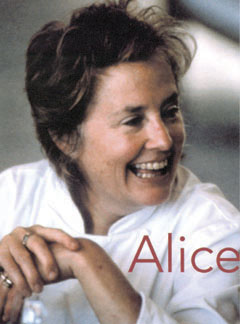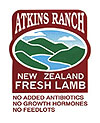|
Executive
Chef Alice Waters
Chez Panisse, Berkeley, CA |
Alice
Waters Cooks A Dream
By Wendy Musk
Photos by Alan Bartl & Maren Caruso
A
COPPER CAULDRON SIMMERS WITH A SUFFUSION OF
AROMATIC HERBS AND.
THE EARTHY ESSENCE OF AUTUMN VEGETABLES HARVESTED
IN RIPE PERFECTION.
A GLOW IN THE BALSAMIC CALM OF THE NORTHERN
CALIFORNIA SUN, ALICE WATERSS
TEACHES REVERENCE FOR LIFE. THE EVENT IS THE
ROBERT MONDAVI
GREAT CHEFS 2000 SERIES. AND SHE IS COOKING
A DREAM.
Waters
is a visionary, the acknowledged forerunner
of the organic food movement, who would invite
the world to dine, extended family all, were
there a farm table long enough and organic
produce plentiful enough within an hour's
drive of her beloved restaurant, Chez Panisse.
On October 16th, however, it was a select
few, supporters, admirers and colleagues,
who gathered amid the simple elegance of the
Mondavi vineyards to share the gentle pleasure
of her expertise, and wisdom.
|
Click
on Images for Captions |
The
scene is a pastoral one; Alice Waters and
staff quietly chopping vegetables for the
afternoon meal. Congregated around the Cutting
board, participants share thoughts along with
recipes for homemade vinegars.
Hostess
Margrit Mondavi, an accomplished chef herself,
chimes in with her favorites from her perch
upon a countertop. The chopping complete,
all migrate to the patio for the grand event,
creating fish soup in a copper cauldron on
an open wood fire.
The
ingredients look too beautiful to cook as
they slide into the heated olive oil releasing
a fragrance that draws all into a circle around
the kettle. Ever enthusiastic, Robert Mondavi
returns again and again to peer into the cauldron
and inhale the delicate aroma, much to the
group's amusement.
Nourish
the Body. Nourish the Earth. Nourish the Soul.
This is the message Alice Waters imparts through
the metaphor of fresh ingredients. To cultivate
the art of living one must live in reciprocity
with the living earth. To serve a garden salad
a la Alice Waters, one must cultivate not
only a garden, but also a community of growers
and providers with like-minded integrity.
And that is exactly what she has done.
Waters
explains, "When the cafe opened, we had
a limited choice of produce suppliers. Like
most restaurants, we got our fruits and vegetables
at the cornmercial produce terminal and a
few local markets. We desperately wanted better
raw materials, but for years we thought the
only way we could get them was by starting
a farm ourselves, or by having a farmer grow
things just for us. Only gradually have we
learned that it takes a network of suppliers,
some forty in all. whom we have discovered
over the years. This network has become indispensable
to us. It is not just a list of purveyors,
but a community of people who share our goals
of providing fresh, perfectly grown food while
promoting a sustainable agriculture that takes
care of the earth."
Waters
judges freshness not by the day but by the
hour. Like her mentor, revered French master
chef, Alain Chapel, she is committed to a
menu dictated by the pick of the day. "All
the ingredients arrive at the kitchen hours
after they have been harvested." To that
end Waters employs a full time Forager, whose
responsibilities entail locating organic farms
and establishing sustainable relationships
with both land and farmers. Waters own father
was the original Forager-in-Chief at Chez
Panisse. He discovered eccentric biodynamic
farmer, Bob Cannard, cultivating 35 acres
on a wooded hillside above the floor of the
Sonoma Valley. "Bob grows a great variety
of produce, from tiny watercress and tender
baby lettuce to spicy rocket, pungent herbs,
earthy potatoes and succulent apricots, peaches,
figs, and raspberries. In the spring he forages
for miner's lettuce. In winter he grows enchanting
radicchios, including the pale yellow~green,
maroon-spotted Castelfranco variety."
Waters' staff drives to Cannard's farm everyday
in summer and every other day in winter, selecting
the freshest fare and dropping off the restaurant's
fruit and vegetable scraps for the farm's
compost. It is a mutually creative cycle.
Alice
Waters was born in the spring season of 1944
in Chatham, New Jersey. A graduate of University
of California at Berkeley in 1967 with a degree
in French Cultural Studies, she pursued a
teaching degree at the Montessori School in
London, followed by a year of travel throughout
France. She returned to California inspired
and with a group of friends opened Chez Panisse,
in 1971, in a cozy two-story house in Berkeley.
Their signs and matchbooks read, "Cafe
and Restaurant." Waters explains,
"I
believed that our new establishment could
be all things to all people. Chez Panisse,
I thought, could have a flower-bedecked dining
room with white linen and candlelight and
soigne cuisine and at the very same time it
could be a bustling neighborhood bistro, with
butcher paper on the tables and old-fashioned
straight-ahead fare where you could get as
much or as little as you wanted. I must have
known at some level that these were irreconcilable
fantasies, but that didn't stop me."
The restaurant was open seven days a week
from seven-thirty to two in the morning. The
daytime chalkboard menu offered simple dishes
a la carte, and the bohemian clientele was
encouraged to linger. At dinnertime lights
were dimmed, the checkered oil cloth table
toppers were replaced with fine linens tO
accompany the ambitious prix-fxed four and
five course dinners. When the satisfied patrons
departed, the formal restaurant metamorphosed
back into a cafe. "It never quite worked."Waters
explained.
"The
restautant was such a huge success that people
started making reservations weeks in advance
and we didn't have enough tables." To
appease the cafe regulars, many of whom were
students, without suffiencient pocket change
to afford the prix-fixed menu, Chez Panisse
opened for coffee and croissants in the early
morning. Frustrations mounted. Clearly, expansion
was the solution.
A
trip to Italy with colleagues and friends
inspired and defined the concept behind Chez
Panisse Cafe. "We ended up in Torino
one freezing November night, outside a little
restaurant. We could see a fire burning inside
and it pulled us in. And there I had my first
pizza out of a wood-burning oven. We all thought
it was the best thing we had eaten on the
whole trip. We shared several pizzas and a
few bottles of wine and by the time we left
we had it all figured out. We would turn upstairs
at Chez Panisse into a cafe, open day and
night, with an exposed kitchen, a grill and
a big brick wood-burning pizza oven, and downstairs
would remain a restaurant with a single carefulIy
composed, fixed-price menu."
The
concept of service evolved too. To provide
the freshest fare, Waters reasoned, one must
have the freshest staff. Hence, a dynamic
correction to the grueling yet commonly accepted
business practice of working chefs seven days
a week on twelve hour stints was initiated.
The Cafe would maintain two chefs on a rotating
schedule of three days on, three days off.
The innovation impacted not only quality and
creative variety, but also the Cafe's ambience.
The alignment of business practice with Waters'
holistic philosophy inspired new levels of
hospitality and community. "I think this
is one of the best organizational moves we
ever made. The line cooks, prep cooks, and
interns who work under the chefs learn twice
as much, and the food is twice as good and
always different."
Alice
Waters brings a woman's attention to the experience
of others. One suspects that had she not become
one of the world's most acclaimed executive
chefs she would have been a painter. Mounting
the stairs at Chez Pannisse Cafe the customer
is drawn into aesthetic communion. "Every
day, a designated cook decides what produce
looks the most beautiful and the most nearly
as if it had been picked that very morning,
and arranges it for display on the counter
in front of the salad-making station."
It is a palette for the palette, evoking a
glorious seventeenth century Spanish still
life painting. Composition is all. Waters
describes it best, "a basket of tiny
spiny purple artichokes or purple striped
eggplants; a few untrimmed bulbs of fennel
with their feathery green tops; an enormous
cardoon plant looking like a giant swollen
head of celery, a rainbow cornucopia of multicolored
glowing tomatoes, some still on the branch;
a few huge tumescent boletus mushrooms or
a pile of perfect morels, smelling faintly
of the woods." The colors and textures
of the still life are meant to be a hint,
enticing the senses and highlighting the ingredients
of the day.
NOURISH
THE BODY. NOURISH THE EARTH. NOURISH THE SOUL.
THIS IS THE MESSAGE ALICE WATERS IMPARTS THROUGH
THE METAPHOR OF FRESH INGREDIENTS. TO CULTIVATE
THE ART OF LIVING, ONE MUST LIVE IN RECIPROCITY
WITH THE LIVING EARTH.
Watets
approaches her art with the patience of a
gardener and the heart of a teacher. That
is why, in 1993, in collaboration with the
principal of Martin Luther King jr. Middle
School in Berkeky she ilutiated the Edibk
Schoolyard Project, [now the largest grantee
of the Chez Panicce Foundation], to teach
children abouc paticnce, susuinability, and
the principles of ecology.
An
abandoned lot adjacent to the school was selected
as the garden site. Asphalt was removed in
December of 1995. It took two years for the
soil-enriching cover crop to prepare the former
parking lot for planting. Now, on an given
day, thirty students participate in the lessons
of nature's bounty, transforming the daily
harvest into a sit-down rneal. "The shape
of the garden continues to evolve as crops
are rotamd and beds are reconfigured. Eventually,
we hope to edibly landscape the entire school
campus, creating a beautiful school with in
a garden." This is how Waters nurtures
the future, with a replicable program that
feeds the child, mind, body and soul.
Waters
is the author of several books, induding The
Chez Panisse Menu Cookbook, Fanny at Chez
Panisse, a storybook and cookbook for children
[dedicated to her 17 year old daughter, Fanny],
Chez Panisse Vegetables, and most recendy
the inspiring, Chez Panisse Cafe Cookbook.
The recipient of numerous prestigious awards,
Waters was named one of the world's ten best
chefs by the magazine Cuisine et Vins du France,
Best Chef in America and Best Restaurant in
America by the James Beard Foundation. She
is also a supporter of the Convivia Slow Foods
Movement whose thoughtful members question
the virulent spread of fast food venues and
their effect on the health and wellbeing of
the world's people.
ROBERT
MONDAVI TAPS HIS TEASPOON AGAINST THE PERFECT
CURVE
OF HIS WINE GLASS. HE AND MARGRIT RISE TO
PROPOSE A TOAST.
“TO ALICE WATERS." HE TURNS TOWARD
HER WITH A WIDE SMILE.
THE MOST WONDERFUL THINGS AT THE TABLE TRULY
HAVE
THEIR ROOTS IN SIMPLICITY.
At
the Mondavi Vineyard, dinner is served. The
dining hall is suffused with a Rembrandtian
inner light. The depth and warmth of Alice
Waters' sharing has created another extended
family gathered at table. Fall Vegeable Bagna
Cauda is prepared with attention to every
detail. The raw vegeables are picture-perfect
and straight from the garden, sliced thin
and sprinkled with sea salt. A warm anchovy
sauce is offered for dipping or spooning at
the diner's discretion. La familia di Robet
Mondavi Pinot Grigio 1999 accompanies this
engagingly light appetizer. Next, the centerpiece
of the meal, Fish Soup Chez Panisse cooked
outdoors in a copper cauldron over a Wood
Fire. It is the symbolic synergy of the day's
teachings, the congenial exchange of ideas,
the autumnal palette of green, gold and orange,
and exquisite ingredients. Robert Mondavi
Napa Vailey Sags Leap Saugivnon Blanc 1998
and a Garden Salad with shailot Vinaigrette
counterpoint.
The
ending of the event, like the meal, is poignant,
pure and sweet, Galcrte Amandine and Caramel
Pear Ice Cream with Mondavi's Napa Valley
Moscato d'Oro 1999, is accompanied by a deep
and abiding sense of satisfaction and nurturance.
There is gratitude in the air. Robert Mondavi
aps his teaspoon against the perfeact curve
of his wine glass. He and Margrit rise to
propose a toast. "To Alice Waters."
He turns toward her with a wide smile.
"The
most wonderful things at the table truly have
their roots in simplicity."
Chef's
Recipes and Other Related Links:
Caramel
Pear Ice Cream
Fish
Soup Cooked over the Wood Fire
Fish
Soup Chez Panisse
Galette
Amandine with Caramel Pear Ice Cream
Garden
Salad with Shallot a Vinaigrette
Peking
Duck Breast Grilled over Vine Branches
Straw
Potato Cake
Fall
Vegetable, Bagna Cauda
Fall
Vegetable Ragout with Mushrooms
Other
Related Links:
Alice
Waters - Bio |



























